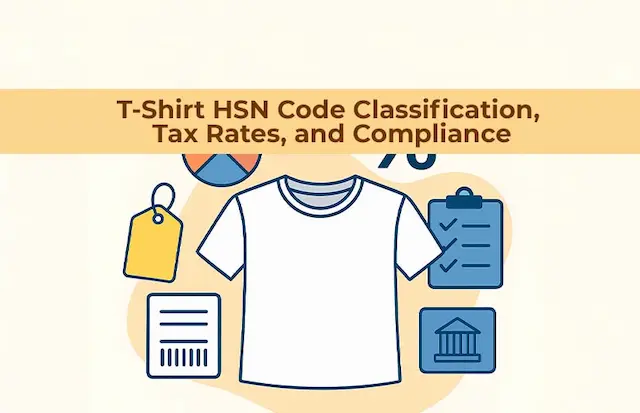In the fast-changing world of business, companies have to deal with lots of rules and categories. One important thing they have to deal with is called the HSN code. It might sound complicated, but it’s actually a really important thing for businesses worldwide. This code is like a secret language used in global trade and taxes.
In this article, we’ll break down what HSN codes are all about, why they matter, and how they affect your business.
Quick Bites on HSN Code
HSN stands for Harmonized System of Nomenclature, a globally accepted system for classifying products.
It was developed by the World Customs Organization (WCO) to standardize product categorization for international trade.
HSN codes comprise six to eight digits, with each digit representing a specific level of classification.
These codes are used in more than 200 countries for customs duties, statistics, and taxation.
HSN codes are essential for accurate product identification and tracking in the global marketplace.
They help streamline logistics, reduce errors, and facilitate efficient customs clearance.
The HSN system is regularly updated to accommodate technological advancements and changes in trade patterns.
HSN codes also form the basis for the Goods and Services Tax (GST) in India.
In the European Union, a similar system called the Combined Nomenclature (CN) is used.
Accurate HSN code classification is crucial for determining applicable tax rates and customs duties.
What is an HSN Code?
The Harmonized System of Nomenclature (HSN) code is a standardized classification system for products traded internationally. It assigns a unique code to each product based on its characteristics, composition, and intended use. HSN codes help customs authorities worldwide classify and identify products accurately, ensuring uniformity in trade documentation and tariff rates.
Who Needs HSN Code?
HSN codes are mostly used by manufacturers, importers, exporters, and traders. Manufacturers used them even before GST. Importers and exporters include them in their paperwork.
Traders get HSN codes from manufacturers and importers. However, if a dealer’s yearly sales are below ₹1.5 crores, they don’t have to use HSN codes.
An Example to Explain an HSN (Harmonized System of Nomenclature) Code
Example: Mobile Phones
Imagine you run a business that imports and sells mobile phones. To correctly classify these mobile phones, you need to assign them an HSN code. Let’s break down the process step by step:
1. Look up the Official HSN Code List: You start by consulting the official HSN code list, which is like a big catalog of product categories and their corresponding codes. For mobile phones, the HSN code could be something like “8517.”
2. Analyze Product Characteristics: Next, you analyze the characteristics of the product. For mobile phones, you consider factors such as:
Composition: Mobile phones are typically made of various materials, including plastic, metal, and glass.
Intended Use: They are designed for communication, internet browsing, and various applications.
Key Features: Mobile phones have features like touch screens, cameras, and operating systems.
3. Determine the Correct HSN Code: Based on your analysis, you determine that the most appropriate HSN code for mobile phones is “8517,” which stands for “Telephones for Cellular Networks or for Other Wireless Networks.” This code accurately describes the product you are importing and selling.
HSN and Its Relationship with Businesses
HSN codes play a pivotal role in various aspects of business operations:
Inventory Management: These codes help businesses categorize products, simplifying inventory management. By assigning unique codes to items, companies can efficiently organize their stock, making it easier to track and manage products.
Export and Import: Accurate HSN code classification is essential for customs declarations, ensuring the seamless flow of goods across borders. Incorrect codes can lead to delays, disputes, and extra costs.
Pricing Strategies: HSN codes influence pricing decisions by determining tax rates and import/export duties. Businesses use them to calculate costs accurately and set competitive prices.
Market Expansion: HSN codes are invaluable for market analysis. Companies can use them to identify potential demand for their products in different regions, aiding in strategic expansion plans.
Compliance: Adhering to HSN coding rules is essential for legal and operational reasons. Compliance ensures that businesses stay on the right side of the law, avoiding fines and disruptions.
Increased Transparency: HSN codes bring transparency to product classifications, making it easier for businesses to understand and communicate the nature of their products both domestically and internationally.
Simplified Taxation: HSN codes simplify tax calculations. They provide a standardized way to determine applicable tax rates, reducing the complexity of tax compliance.
Facilitation of Trade Statistics: HSN codes are crucial for gathering trade statistics. Governments and businesses rely on these codes to track the flow of goods, measure economic trends, and plan future trade strategies.
HSN Code and GST Compliance
In the Indian context, HSN codes are intimately intertwined with the Goods and Services Tax (GST) system, forming the backbone of the country’s taxation structure. Here’s a more detailed exploration of how HSN codes and GST compliance are interlinked:
HSN Codes and GST Classification:
Every product or service traded in India is categorized under a specific HSN code. These codes range from two to eight digits, providing a detailed description of the product.
The GST system in India relies heavily on these HSN codes to determine the appropriate tax rates for different goods and services. Each HSN code is associated with a specific GST rate, which can vary based on the nature and value of the product.
Accurate HSN code classification is crucial for businesses, as it directly impacts the amount of GST they need to charge, collect, and remit to the government.
The HSN code not only identifies the product but also specifies its taxable category, making it a pivotal factor in ensuring tax compliance.
Importance of Accurate HSN Code Classification for GST Compliance:
Correctly classifying products under the appropriate HSN code is vital for businesses to calculate and remit the correct amount of GST. Any misclassification can lead to underpayment or overpayment of taxes.
Non-compliance with HSN code classification can have serious consequences, including penalties and legal troubles. The Indian tax authorities are stringent about ensuring that businesses adhere to the right HSN codes.
Accurate HSN code classification simplifies the process of filing GST returns, as it ensures that the tax amount calculated aligns with the tax rates prescribed for the specific products.
It also reduces the risk of audits and tax disputes, as businesses can provide clear documentation and evidence of their correct HSN code classification, demonstrating their commitment to compliance.
How HSN Code Affects Your Business and Its Importance
The significance of HSN codes to your business cannot be overstated:
Taxation Accuracy: HSN codes make sure your business pays the right amount of tax. They’re like a cheat sheet that tells you how much tax you should pay for each product. Using the correct HSN code means you won’t pay too much or too little tax. This accuracy keeps your finances in check and makes sure the tax process is fair and clear.
Reduced Errors: HSN codes help avoid mistakes in paperwork and shipping. When you use the right code for your product, it reduces the chances of problems when your stuff goes through customs. Fewer mistakes mean fewer delays and less money wasted. Your business can run smoother and save time and cash.
Competitive Advantage: Getting HSN codes right can give your business an edge. When you classify your products accurately, you can figure out taxes and import/export costs precisely. This helps you offer better prices to customers, which can attract more buyers. Plus, if your customs processes are efficient, it can speed up deliveries, making your business more attractive in the market.
Global Expansion: Accurate HSN coding is a passport to global business growth. When your products are sorted correctly, international trade becomes easier. You can confidently explore new markets knowing your products meet the rules of those countries. This opens doors to more customers worldwide and brings in new business opportunities.
Compliance and Legal Security: Following HSN code rules is crucial for staying on the right side of the law. It’s like obeying traffic rules to avoid accidents. Properly classifying your products and using the right HSN codes ensures you follow tax and customs laws. This keeps you safe from fines and legal problems due to incorrect or incomplete paperwork. It also builds a good reputation for your business, showing you’re responsible and trustworthy.
How to Determine the Correct HSN Code for Your Products
Determining the correct HSN (Harmonized System of Nomenclature) code for your products is like finding the right key to unlock international trade opportunities.
Consult the HSN Code List: Begin by checking the official HSN code list. This list is like a dictionary that helps you find the right code for your product. It’s a reliable starting point to understand how your product is classified.
Analyze Product Characteristics: Look closely at your product. Think about what it’s made of, what it’s used for, and what makes it unique. These details will guide you in picking the correct HSN code that accurately describes your product.
Seek Expert Advice: When in doubt, it’s wise to ask experts or tax professionals for help. They’re like navigators who can guide you through the HSN coding maze. They have the knowledge and experience to ensure you choose the right code for your product.
Regular Updates: Keep an eye on changes in the HSN system. Just like software updates, HSN codes can change too. New codes may be introduced, and existing ones might be adjusted. Staying informed about these updates ensures that your product classifications remain accurate and up-to-date.
Final Words
In conclusion, HSN codes are the unsung heroes of international trade and taxation, playing a vital role in your business’s daily operations and growth. Understanding and effectively utilizing HSN codes can lead to improved accuracy, compliance, and competitiveness in the global marketplace. It’s time to unlock the power of these seemingly cryptic numbers for the benefit of your business.
FAQs
Q1: What exactly is an HSN code, and why is it important for my business?
A1: An HSN code, or Harmonized System of Nomenclature code, is a numerical classification system for products used in international trade. It’s important for businesses because it helps in accurate taxation, smoother customs processes, and proper categorization of products.
Q2: How can incorrect HSN code classification impact my business?
A2: Incorrect classification can lead to overpaying for underpaying taxes, customs delays, disputes, and even legal issues. It can also affect pricing strategies, making your products less competitive.
Q3: How do HSN codes relate to Goods and Services Tax (GST) in India?
A3: In India, HSN codes are closely linked to GST. Each product is assigned a specific HSN code, which determines the applicable GST rate. Accurate coding is vital for correct tax calculation and GST compliance.
Q4: Can using the right HSN codes give my business a competitive advantage?
A4: Absolutely. Proper HSN code management can lead to competitive advantages, such as accurate pricing, faster customs clearance, and the ability to explore new markets confidently.
Q5: Is it essential for my business to stay updated with changes in HSN codes?
A5: Yes, staying updated is crucial. The HSN system evolves to accommodate changes in products and trade practices. Being aware of updates ensures that your business uses the most current codes.
Q6: How can I ensure I’m using the correct HSN code for my products?
A6: To determine the correct HSN code, consult the official HSN code list, analyze your product’s characteristics, consider expert advice when needed, and stay informed about any changes in the HSN system.
Q7: What role do HSN codes play in international trade and market expansion?
A7: HSN codes simplify international trade by providing a common language for product classification. They help businesses explore new markets by identifying demand for their products in different regions.
Q8: How do HSN codes contribute to legal compliance and security for businesses?
A8: Adhering to HSN code regulations ensures legal compliance, shielding businesses from fines and legal complications. Proper classification demonstrates responsibility and trustworthiness.
Q9: Can HSN codes be used for more than just taxation?
A9: Yes, HSN codes have multiple applications beyond taxation, including customs declarations, inventory management, market analysis, and trade statistics.
Q10: What’s the first step my business should take to harness the benefits of HSN codes?
A10: Start by understanding the HSN code system and how it applies to your products. Then, ensure accurate classification and compliance to maximize the benefits for your business.




